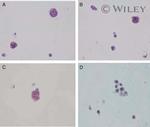Search Thermo Fisher Scientific
Invitrogen
P-cadherin Monoclonal Antibody (NCC-CAD-299)
FIGURE: 1 / 2
P-cadherin Antibody (13-5800) in Neu


Product Details
13-5800
Species Reactivity
Published species
Host/Isotype
Class
Type
Clone
Immunogen
Conjugate
Form
Concentration
Purification
Storage buffer
Contains
Storage conditions
Shipping conditions
RRID
Product Specific Information
Source: Monoclonal antibody was obtained by fusing the mouse myeloma cell-line P3-X63-Ag8-U1 with spleen cells of BALB/c mouse after immunization with human epidermal carcinoma cell A431.1) The monoclonal antibody was harvested from ascitic fluid.
Reconstitution: Dissolve the lyophilized antibody in 50 µL of distilled water (final concentration: 2.0 mg/mL).This solution can be used as a stock solution. If dilution is necessary for your application, dilute the stock solution with the following Dilution solution just prior to use. When the entire amount of antibody is to be used over a short time period, it may be dissolved directly in 500 µL or more of the Dilution solution. Be sure to store the antibody at a minimum concentration of 2.0 mg/mL. A lower antibody concentration may result in decreased stability. Reconstituted antibody solution should contain 0.1% sodium azide as a preservative when stored at 4°C.
Specificity: This antibody specifically reacts with human P-cadherin. This antibody inhibits P-cadherin dependent cell-cell contact.
Storage: 4°C This product does not contain preservative. The stock solution (2.0 mg/mL) should be stored in aliquots at -20°C for 1 year, or should be stored at 4°C for 6 months after adding 0.1% sodium azide. Avoid repeated freeze-thaw cycles.
Target Information
P-cadherin, also known as Cadherin-3, is a Type 1 cadherin protein that belongs to the cadherin superfamily. Type 1 cadherins are single-pass transmembrane proteins that have 5 extracellular cadherin repeats and an intracellular domain that binds p120-catenin and beta-catenin. Cadherins are calcium-dependent cell-cell adhesion glycoproteins responsible for a range of processes including development, wound healing, cell-cell signaling, cell growth and differentiation. P-cadherin is expressed in human fetal structures, and in adult tissues such as the basal layer of the epidermis, breast, prostate, ovary, cervix, hair follicle, and corneal endothelium. P-cadherin expression has also been reported on embryonic stem cells, and stem cells of the normal mammary gland, and hair follicle. Overexpression of P-cadherin has been associated with poor prognosis in breast, prostate, ovary, colon, and stomach carcinomas. Mutations in CDH3 are associated with congential hypotrichosis with juvenile macular dystrophy.
For Research Use Only. Not for use in diagnostic procedures. Not for resale without express authorization.
Bioinformatics
Protein Aliases: CADH3; cadherin 3, type 1, P-cadherin (placental); Cadherin-3; calcium-dependent adhesion protein, placental; P-cadherin; Placental cadherin; Placental-cadherin
Gene Aliases: CDH3; CDHP; HJMD; PCAD
UniProt ID: (Human) P22223
Entrez Gene ID: (Human) 1001

Performance Guarantee
If an Invitrogen™ antibody doesn't perform as described on our website or datasheet,we'll replace the product at no cost to you, or provide you with a credit for a future purchase.*
Learn more
We're here to help
Get expert recommendations for common problems or connect directly with an on staff expert for technical assistance related to applications, equipment and general product use.
Contact tech support
